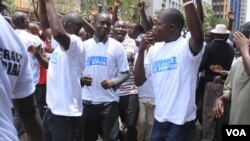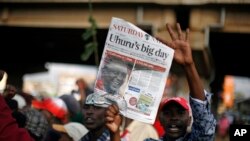NAIROBI —
Kenyan Prime Minister Raila Odinga filed a petition in the Supreme Court Saturday challenging the results of the presidential election in which he came in second place. Odinga’s supporters rallied at the gates of the courthouse in support of the petition.
Wearing white t-shirts with the slogan "Democracy on Trial," Odinga’s supporters shouted their call for justice outside the Supreme Court in downtown Nairobi.
Police fired tear gas to disperse the protesters early in the day and there were reports of some injuries. But the crowd later regrouped.
They came out in support of Odinga’s CORD coalition, as his lawyers filed a petition challenging the election outcome.
Youth leader Andrew Onyango says he feels cheated by election officials who declared Odinga’s rival, Uhuru Kenyatta, the outright winner of the March 4 vote.
"Me personally, you can look at my hand, I voted. And I still have the ink with me. And I went there at five in the morning and I voted at five in the evening. That is in evidence, commitment and energy. Time wasted. Nobody wants to feel [like] that. They just want to force food in us that we don’t want," said Onyango.
Kenyatta Named Winner of Kenya's Presidential Election
Kenya’s electoral commission, the IEBC, certified Kenyatta after he won 50.07 percent of the vote - just enough to avoid a run-off with Odinga.
But the vote counting was marred by significant technical problems, including the complete failure of an electronic transmission system.
CORD says it has evidence of other irregularities and cases of fraud during the election, including instances where the number of valid votes cast in certain polling stations exceeded the number of registered voters.
In a statement Saturday, Odinga said if he did not challenge the results Kenyans would “lose their faith in elections and in democracy.”
He also promised to honor the court’s decision.
"I have repeatedly indicated my commitment to respect and abide by the Supreme Court ruling. I invite my brother, honorable Uhuru Kenyatta to publicly do the same," he said.
Members of Kenyatta’s Jubilee coalition have said the party will respect the Supreme Court’s ruling.
Odinga has compared the March elections to the disputed vote in 2007, which he also lost by a narrow margin, and which sparked inter-ethnic violence that killed more than 1,100 people.
Politicians from all sides have called for peace, foremost, despite the disputes surrounding the vote.
But some protesters, like Dennis, a Nairobi resident who declined to give a second name, say peace is being imposed at the cost of the truth.
"Peace comes from justice also. I can’t say that I want peace and I’m bullying you every time. I don’t want you to receive justice. It’s not good. You cannot force peace. Peace is out of a goodwill," he said.
In addition to Odinga, several civil society groups are also challenging the conduct of the elections.
The constitution gives the Supreme Court two weeks to make a decision.
Wearing white t-shirts with the slogan "Democracy on Trial," Odinga’s supporters shouted their call for justice outside the Supreme Court in downtown Nairobi.
Police fired tear gas to disperse the protesters early in the day and there were reports of some injuries. But the crowd later regrouped.
They came out in support of Odinga’s CORD coalition, as his lawyers filed a petition challenging the election outcome.
Youth leader Andrew Onyango says he feels cheated by election officials who declared Odinga’s rival, Uhuru Kenyatta, the outright winner of the March 4 vote.
"Me personally, you can look at my hand, I voted. And I still have the ink with me. And I went there at five in the morning and I voted at five in the evening. That is in evidence, commitment and energy. Time wasted. Nobody wants to feel [like] that. They just want to force food in us that we don’t want," said Onyango.
Kenyatta Named Winner of Kenya's Presidential Election
Kenya’s electoral commission, the IEBC, certified Kenyatta after he won 50.07 percent of the vote - just enough to avoid a run-off with Odinga.
But the vote counting was marred by significant technical problems, including the complete failure of an electronic transmission system.
CORD says it has evidence of other irregularities and cases of fraud during the election, including instances where the number of valid votes cast in certain polling stations exceeded the number of registered voters.
Raila Odinga
Raila Odinga- Prime minister, head of the CORD alliance
- 68 years old, son of Kenya’s first vice president
- Unsuccessfully ran for president against Mwai Kibaki in 2007
- Elected to parliament in 1992
- Charged with treason and detained without trial in the 1980s
He also promised to honor the court’s decision.
"I have repeatedly indicated my commitment to respect and abide by the Supreme Court ruling. I invite my brother, honorable Uhuru Kenyatta to publicly do the same," he said.
Members of Kenyatta’s Jubilee coalition have said the party will respect the Supreme Court’s ruling.
Odinga has compared the March elections to the disputed vote in 2007, which he also lost by a narrow margin, and which sparked inter-ethnic violence that killed more than 1,100 people.
Politicians from all sides have called for peace, foremost, despite the disputes surrounding the vote.
But some protesters, like Dennis, a Nairobi resident who declined to give a second name, say peace is being imposed at the cost of the truth.
"Peace comes from justice also. I can’t say that I want peace and I’m bullying you every time. I don’t want you to receive justice. It’s not good. You cannot force peace. Peace is out of a goodwill," he said.
In addition to Odinga, several civil society groups are also challenging the conduct of the elections.
The constitution gives the Supreme Court two weeks to make a decision.






